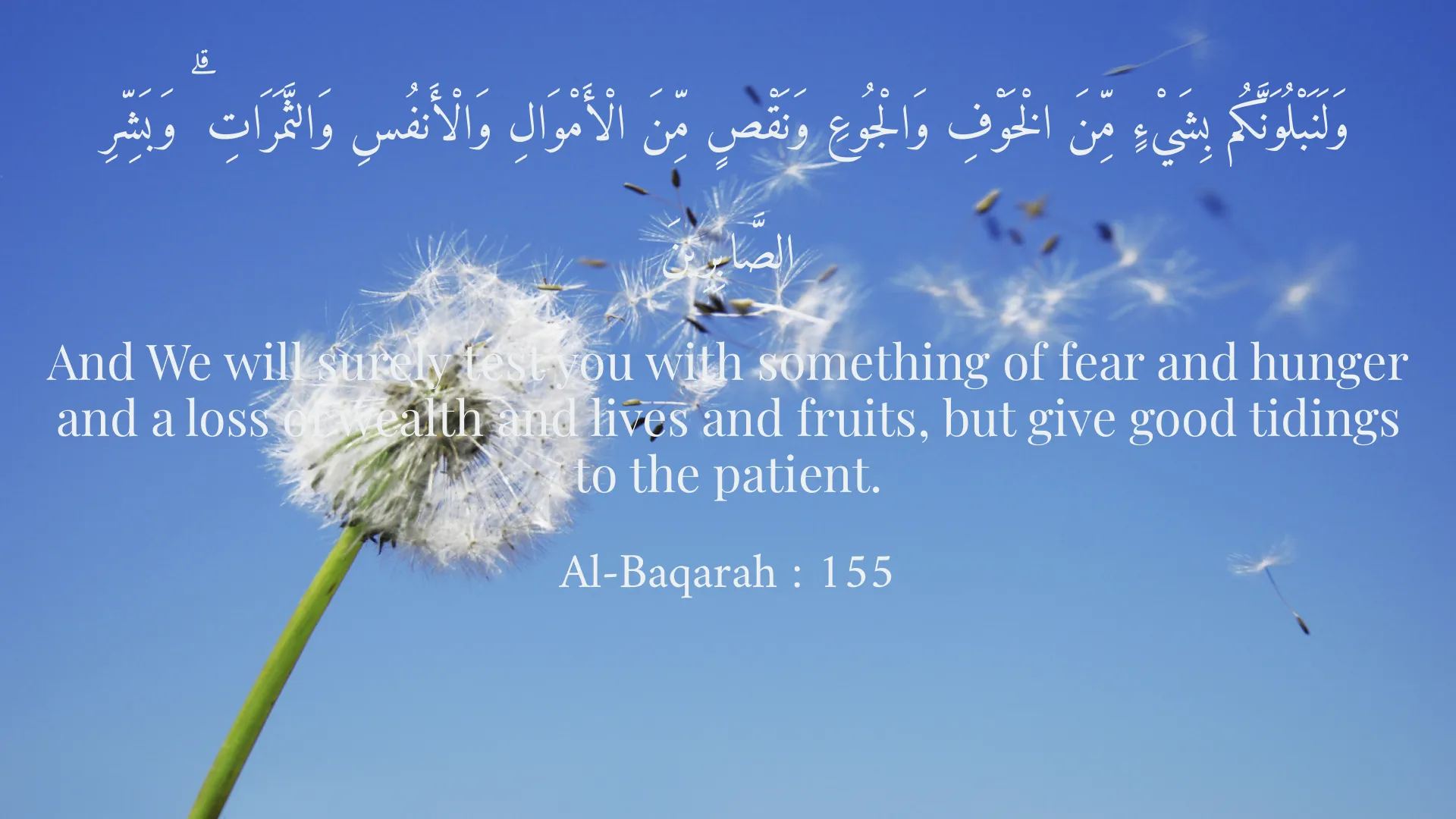Quranic Answer

In the rich tapestry of the Holy Quran, the concepts of happiness and gratitude are beautifully interwoven as essential attributes for believers. However, it is crucial to understand that these traits do not suggest a lifelong state of unwavering happiness. Rather, life itself is an intricate journey filled with challenges, trials, and tribulations, which provide the opportunity for a diverse range of emotions to unfold throughout a lifetime. Many verses in the Quran speak to this duality, illuminating the reality that both joy and sorrow play significant roles in the human experience. One of the profound verses that highlight the necessity of patience amidst adversity is verse 155 of Surah Al-Baqarah. Allah states: "And We will surely test you with something of fear and hunger and a loss of wealth and lives and fruits, but give good tidings to the patient." This verse encapsulates the essence of life's struggles, reminding believers that hardships are not mere accidents of existence but divine tests designed to cultivate resilience and patience. Life's challenges are often perceived as obstacles; however, the Quran frames them instead as opportunities for spiritual growth. Thus, patience is not a passive state but an active engagement with one's circumstances, requiring faith and strength. Moreover, the Quran emphasizes the importance of remembrance of Allah as a path to true contentment and tranquility. In verse 28 of Surah Ar-Ra'd, Allah poses a reflective question: "Is it not time for the believers that their hearts should become humbly submissive to the remembrance of Allah?" This verse serves as a reminder that amidst the chaos and struggles of life, turning our hearts towards God provides solace and peace. It suggests that internalizing gratitude towards Allah, even in the face of challenges, can lead to a state of inner happiness that transcends external circumstances. It is essential to recognize that happiness in this context does not equate to constant elation or the absence of sorrow. Instead, it encapsulates a deeper, more profound sense of peace that comes from aligning one's life with divine guidance and embracing both blessings and challenges. This duality is key in understanding the Quranic perspective on happiness; it invites believers to cultivate emotional intelligence by acknowledging their feelings, whether positive or negative. Throughout the Quran, there are numerous instances where trials lead to introspection, teaching believers about the transient nature of worldly happiness. For example, in the face of loss or despair, the Quran encourages individuals to reflect deeply and seek comfort in their faith. The belief that Allah is always present and aware of one’s struggles can foster a sense of community, empathy, and shared experience among individuals. Furthermore, it provides a foundation for building resilience and accepting the trials of life as part of a greater divine plan. Additionally, the Quran encourages a perspective of gratitude even when faced with hardships. In Surah Al-Imran, verse 173, Allah mentions, "So do not weaken and do not grieve, and you will be superior if you are [true] believers." This verse underscores the idea that true superiority stems from faith and reliance on Allah, regardless of one’s immediate circumstances. Here, gratitude becomes an act of faith; by acknowledging Allah’s wisdom and mercy, even during life's lows, believers can transform their mindset, fostering an environment where happiness can thrive. The relationship between happiness and gratitude in Islam is deeply intertwined with the concept of Tawheed, the Oneness of Allah. It is through recognizing and reaffirming this belief that individuals can navigate the complexities of life with optimism and resilience. Each trial is seen as an opportunity to enhance one's spiritual state and grow closer to Allah, allowing believers to maintain a hopeful outlook on life’s journey. Moreover, the Quran places a significant emphasis on the importance of community and support among believers, suggesting that collective patience and gratitude can amplify an individual’s sense of happiness. When individuals come together to support one another, sharing their burdens and joys, it creates a nurturing environment where faith can flourish. This is evident in the teachings of the Prophet Muhammad (peace be upon him), who emphasized community values, compassion, and the importance of being there for one another. In conclusion, the teachings of the Holy Quran illuminate a profound understanding of happiness and gratitude that transcends mere emotional states. True happiness is not found in the absence of suffering but in the heart's submission to Allah, the recognition of His ultimate wisdom, and the practice of thankfulness in all circumstances. By embracing both the good and the challenging moments in life and maintaining a consistent remembrance of Allah, believers can cultivate a deep-seated tranquility that serves as a source of true joy. This holistic view encourages individuals to embrace their emotional experiences, fostering resilience, community support, and unwavering faith in the divine, ultimately leading to a more fulfilled and meaningful life.
Related Verses
وَلَنَبْلُوَنَّكُم بِشَيْءٍ مِّنَ الْخَوْفِ وَالْجُوعِ وَنَقْصٍ مِّنَ الْأَمْوَالِ وَالْأَنفُسِ وَالثَّمَرَاتِ ۗ وَبَشِّرِ الصَّابِرِينَ
And We will surely test you with something of fear and hunger and a loss of wealth and lives and fruits, but give good tidings to the patient.
Al-Baqarah : 155
أَلَمْ يَأْنِ لِلَّذِينَ آمَنُوا أَن تَخْشَعَ قُلُوبُهُمْ لِذِكْرِ اللَّهِ
Is it not time for the believers that their hearts should become humbly submissive to the remembrance of Allah?
Ar-Ra'd : 28
Short Story
One day, a man named Hossein was in the market when he suddenly started discussing life and happiness with his friends. He said that we should always be happy. One of his friends replied that life isn't just about joy and that one must accept that hardships and challenges are part of it too. Hossein thought for a moment and realized his friend was right. He decided that instead of expecting to always be happy, he would be stronger in the face of problems and never forget the remembrance of God.